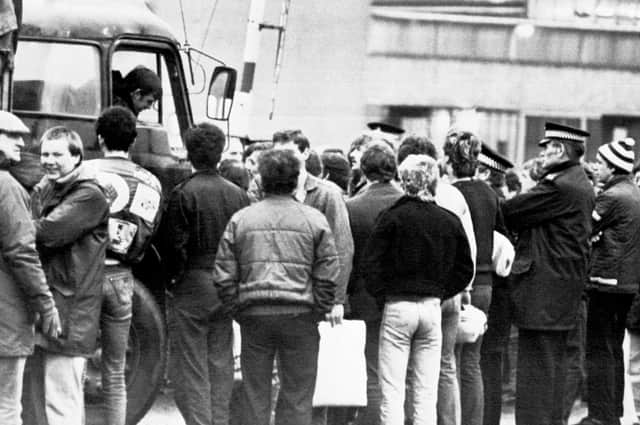Miners' strike: Pardon represents some justice for people who were fighting for their jobs and communities – Ian Swanson


Last week, on the recommendation of an independent inquiry into the policing of the bitter dispute, the Scottish Government announced a collective pardon for hundreds of miners convicted of low-level offences like breach of the peace, which for many of them led to dismissal, blacklisting and hardship.
The move represents some justice for men who were fighting for their livelihoods against a National Coal Board intent on closing mines and a UK government determined to crush the unions.
Advertisement
Hide AdAdvertisement
Hide AdIn its report the inquiry, led by John Scott QC, quoted one miner saying: “The 1972 strike was a strike about money. This was about jobs and communities.”
And the report noted the government had made no effort to create alternative employment for communities affected.
The release of official papers from the time shows that despite denials by ministers, miners’ leader Arthur Scargill was right when he claimed the NCB planned to close 70 pits with the loss of 70,000 jobs.
Prime Minister Margaret Thatcher referred to striking miners as "the enemy within".
Advertisement
Hide AdAdvertisement
Hide AdAnd Cabinet papers reveal how she tried to micromanage the handling of the strike, receiving regular updates on numbers of arrests and court cases from across the country discussing how to "stiffen the resolve of chief constables" and pressing courts to speed up cases so miners saw their workmates being punished.
Special attention was paid to Scotland. Minutes of a Cabinet sub-group chaired by Mrs Thatcher on May 8, 1984 noted: “It was not clear whether the Scottish Chief Constables were prepared to go as far as their English counterparts to prevent pickets from going to the scene of a possible disturbance. It was possible also that Scottish Chief Constables might feel an undue reluctance to call for the help of forces south of the border through mutual aid arrangements.”
Ministers even discussed individual pits, like Bilston Glen in Midlothian. Cabinet minutes for June 21, 1984 said: “About 30 miners had reported for duty at Bilston Glen colliery in Scotland and coal production had started for the first time since the beginning of the strike. It had not been possible to continue production because the local NUM had withdrawn safety cover. If production was resumed and maintained at Bilston Glen it would have psychological significance out of all proportion to the amount of coal produced: it would be the first pit in the notoriously militant Scottish coalfield to return to work.”
Alex Bennett, who was chairman of the NUM at Monktonhall near Musselburgh and was arrested for breach of the peace outside Bilston Glen, has said there was no trouble on the picket line at the start of the strike because it was local police who were deployed, but then outside officers were drafted in and “snatch squads” started making arrests.
Advertisement
Hide AdAdvertisement
Hide AdIt took time for campaigners like Lothian Labour MSP Neil Findlay to persuade the Scottish government to hold an inquiry, but former Justice Secretary Michael Matheson deserves credit for setting it up and his successor Humza Yousaf for agreeing to the pardon.
As Alex Bennett said it “rights a wrong”. But nothing can undo the injustice and suffering inflicted on families and communities who were fighting for survival.
A message from the Editor:
Thank you for reading this article on our website. While I have your attention, I also have an important request to make of you.
The dramatic events of 2020 are having a major impact on many of our advertisers - and consequently the revenue we receive. We are now more reliant than ever on you taking out a digital subscription to support our journalism.
Subscribe to the Edinburgh Evening News online and enjoy unlimited access to trusted, fact-checked news and sport from Edinburgh and the Lothians. Visit www.edinburghnews.scotsman.com/subscriptions now to sign up.
Joy Yates
Editorial Director
Comment Guidelines
National World encourages reader discussion on our stories. User feedback, insights and back-and-forth exchanges add a rich layer of context to reporting. Please review our Community Guidelines before commenting.